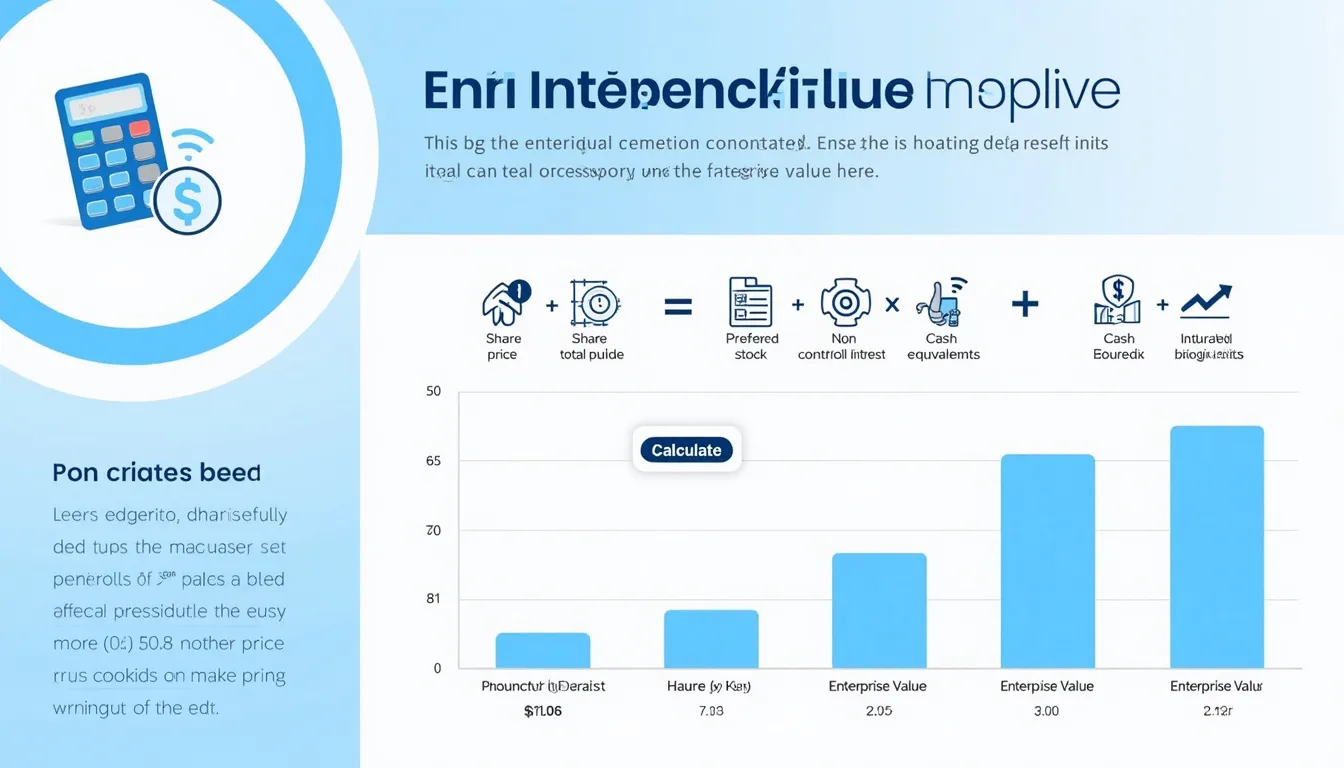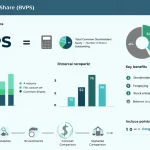Enterprise Value Calculator
Is this tool helpful?
How to Use the Enterprise Value Calculator Effectively
Use this Enterprise Value Calculator to quickly and accurately determine the total value of a company beyond just its market capitalization. Follow these simple steps with example inputs to get started:
- Enter the current share price in USD. For instance, input 35.75 or 120.10.
- Provide the number of fully diluted shares outstanding. Try values like 50,000,000 or 125,000,000.
- Input the company’s total debt (including short-term and long-term) in USD. Examples: 300,000,000 or 75,500,000.
- Enter the value of preferred stock if applicable. For example, 25,000,000 or 0 if none.
- Include the value of any non-controlling interest. Possible inputs: 15,000,000 or 5,000,000.
- Provide the amount of cash and cash equivalents in USD. Example values: 50,000,000 or 90,000,000.
- Click “Calculate Enterprise Value” to see your results.
The calculator will display detailed results, including equity value, total debt, preferred stock, non-controlling interest, cash and cash equivalents, and the final computed enterprise value.
What Is Enterprise Value? Definition, Purpose, and Key Benefits
Enterprise Value (EV) is a comprehensive financial metric that captures the total value of a company, reflecting not only its equity but also debt and cash positions. Unlike simple market capitalization, EV offers a holistic view of a company’s worth, factoring in obligations and liquid assets. This makes it an essential tool for investors, analysts, and corporate decision-makers.
Purpose: Enterprise Value estimates the theoretical price to acquire a company outright, including assuming its debts and adjusting for cash reserves. It provides a realistic valuation useful for mergers & acquisitions, investment analysis, and financial planning.
Enterprise Value Formula Explained
The calculation of Enterprise Value can be represented as:
$$ EV = \text{Market Capitalization} + \text{Total Debt} + \text{Preferred Stock} + \text{Non-controlling Interest} – \text{Cash and Cash Equivalents} $$Where Market Capitalization is calculated by:
$$ \text{Market Capitalization} = \text{Share Price} \times \text{Fully Diluted Shares Outstanding} $$Key Benefits of Using the Enterprise Value Calculator
- Enhanced Accuracy: Captures multiple financial components for a more precise company valuation.
- Time Savings: Automates complex calculations, removing the need for manual processing.
- Cross-Industry Comparisons: Facilitates fair comparisons between companies with differing capital structures.
- Informed Investment Decisions: Provides comprehensive insights to guide portfolio strategies.
- M&A Readiness: Supports detailed evaluation of acquisition target costs and benefits.
- Strategic Financial Planning: Assists CFOs and planners in forecasting the impact of financial moves on company value.
Example: How the Enterprise Value Calculator Works
Let’s walk through a sample calculation using the Enterprise Value Calculator to understand its practical utility.
Sample Inputs:
- Share Price: $42.50
- Fully Diluted Shares Outstanding: 60,000,000
- Total Debt: $250,000,000
- Preferred Stock: $30,000,000
- Non-Controlling Interest: $12,000,000
- Cash and Cash Equivalents: $40,000,000
Step 1: Calculate Equity Value
Market Capitalization = Share Price × Fully Diluted Shares Outstanding
$$ \text{Equity Value} = 42.50 \times 60,000,000 = 2,550,000,000 $$Step 2: Calculate Enterprise Value
$$ EV = 2,550,000,000 + 250,000,000 + 30,000,000 + 12,000,000 – 40,000,000 = 2,802,000,000 $$This means the total enterprise value of the company is approximately $2.8 billion. This figure accounts for the company’s total equity, debt, preferred stock, minority interests, and available cash reserves.
Why This Matters
Using the Enterprise Value Calculator ensures you evaluate a company’s valuation with nuance and precision, helping investors and business professionals make more informed decisions grounded in the company’s full financial picture.
Practical Applications of the Enterprise Value Calculator
This powerful financial tool serves a variety of essential roles across different industries and roles:
1. Investment Analysis
Investors can compare investment opportunities by evaluating companies’ enterprise values versus their market caps to identify undervalued or overvalued stocks.
2. Mergers and Acquisitions (M&A)
Acquirers use EV to estimate the total cost of buying a target company, accounting for liabilities and cash reserves that affect the purchase price.
3. Industry Benchmarking
Financial analysts compare EVs among competitors within the same industry to gauge relative valuations adjusted for capital structure differences.
4. Valuation Multiples
Enterprise value is combined with earnings measures like EBITDA to create valuation multiples (e.g., EV/EBITDA), widely used in financial modeling and company comparisons.
5. Private Equity and Buyout Evaluation
Private equity firms leverage EV to determine acquisition prices and structure investment deals for potential buyouts or recapitalizations.
6. Corporate Financial Strategy
CFOs utilize the calculator as part of scenario planning, evaluating how changes in debt levels or cash reserves impact overall company value.
Frequently Asked Questions (FAQs) About Enterprise Value
What does Enterprise Value represent?
Enterprise Value is the total value of a company, reflecting its market capitalization combined with debt and other financial obligations, minus any cash holdings.
How is Enterprise Value different from Market Capitalization?
While market capitalization reflects only the equity value, Enterprise Value captures debt, preferred stock, minority interests, and subtracts cash, providing a fuller valuation picture.
Why subtract cash in the Enterprise Value calculation?
Cash reduces the net cost to acquire a company since it could be used to pay down debt or reduce the purchase price, so it is deducted in the EV formula.
What are fully diluted shares outstanding?
They include all shares currently outstanding plus shares that could potentially be issued through convertible securities, stock options, or warrants.
How often should I recalculate a company’s Enterprise Value?
Since share prices and debt levels fluctuate, it’s best to recalculate EV regularly, especially before making investment or acquisition decisions.
Can Enterprise Value be negative?
Although uncommon, EV can be negative if a company’s cash exceeds the sum of its market cap and debt, which may signal unique financial situations.
How does Enterprise Value facilitate company comparisons?
Because EV accounts for debt and cash, it allows comparisons of companies with different capital structures on a more equal footing.
Is a higher Enterprise Value always better?
Not necessarily; a higher EV means a higher acquisition cost. Investors should consider EV in conjunction with other financial metrics to assess company attractiveness.
How reliable is this Enterprise Value Calculator?
Our calculator provides accurate results based on your inputs, but we recommend consulting financial professionals for critical or complex decisions to ensure comprehensive analysis.
Conclusion: Unlock the Power of Enterprise Value for Better Financial Decisions
The Enterprise Value Calculator is an essential resource for investors, analysts, and business leaders seeking a thorough and accurate company valuation. By incorporating debt, preferred equity, minority interests, and cash adjustments, it offers a more nuanced view than market capitalization alone.
- Achieve more accurate company valuations.
- Make smarter investment decisions backed by comprehensive data.
- Enhance merger and acquisition evaluations.
- Improve comparative analysis across industries and capital structures.
- Support strategic financial planning and forecasting efforts.
Harnessing the Enterprise Value Calculator empowers you to gain deeper financial insight and confidently navigate complex valuation scenarios. Start utilizing this tool today to elevate your financial analysis and decision-making to the next level.
Important Disclaimer
The calculations, results, and content provided by our tools are not guaranteed to be accurate, complete, or reliable. Users are responsible for verifying and interpreting the results. Our content and tools may contain errors, biases, or inconsistencies. Do not enter personal data, sensitive information, or personally identifiable information in our web forms or tools. Such data entry violates our terms of service and may result in unauthorized disclosure to third parties. We reserve the right to save inputs and outputs from our tools for the purposes of error debugging, bias identification, and performance improvement. External companies providing AI models used in our tools may also save and process data in accordance with their own policies. By using our tools, you consent to this data collection and processing. We reserve the right to limit the usage of our tools based on current usability factors.







